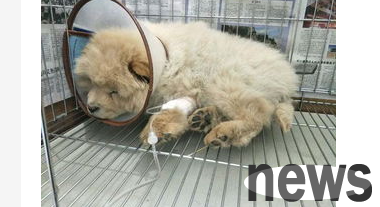I believe that many friends who raise dogs have some understanding of parvovirus. It will be very painful for dogs to suffer from parvovirus, and the cure rate is relatively low. In early spring, dogs have a high incidence period, so everyone must take precautions to keep their dogs away from parvovirus. How does

parvovirus spread?
After contacting the virus in the environment, the dog will be infected. The virus is excreted with infected dog feces and can be stably present in the environment for a long time. These viruses will be taken to many other places very easily. A dog will also be infected without contacting feces with viruses. Particles of parvovirus can live in soil or outdoor environment for 5 to 7 months (in cold climates, they can survive longer). If the particles of these viruses stick to the dog's paws and hair and then are eaten into the dog's body, the dog will be infected with parvovirus.
What should I do if a dog has parvovirus? Prevention is the main thing, treatment is the auxiliary
parvovirus is the most susceptible to infection of puppies, but adult dogs are not vaccinated or have impaired immunity and may also be infected.
Parrogies enter the dog's body through the mouth. Dogs will show infection after 3-7 days. In just a few days, infected dogs will develop parvovirus in feces and may infect other similar species around them. If the dog recovers, the symptoms gradually disappear, but the dog continues to excrete the virus from the feces during the illness until the weeks after recovery.
Symptoms of small infections in dogs
Typical symptoms of puppies include: diarrhea, vomiting, loss of appetite and lethargy. The virus quickly invades normal cells in the affected dog, especially bone marrow and intestinal cells. Damage to bone marrow cells is manifested as the number of white blood cells in the blood decreases, and the body's immune system is paralyzed. The damage to intestinal cells is manifested as: the endometrium is damaged, the body cannot digest and absorb nutrients normally, the symptoms are nausea, vomiting and severe diarrhea, and bloody stools are more common, and the smell is harder and worse than normal stools.
Ultimately, as the disease damages the body, the puppies can become very weak and severely dehydrated. When the intestinal wall is severely damaged and the barrier effect of blocking bacteria is lost, a blood infection may occur, which ultimately causes sepsis. Sadly, many dogs are hard to escape once they are infected with parvovirus. Early detection and treatment are very important.
How to prevent dog parvovirus?
1. Vaccination is required for
, which is a necessary step to prevent parvovirus. It is best to give dogs six-pair vaccines, so their resistance can be enhanced.
2. Avoid contact
When entering a pet hospital, you should not let your dog run around and sniff dogs with parvovirus. When you go out, try to reduce contact with strange dogs as much as possible.
3. Pay attention to dietary attention to the food you feed. Do not feed milk or anything like that. Try to feed as little raw food as possible, avoid feeding dogs, chickens and duck bones. You can feed some nutritional supplements that help dogs digest.

4. Environmental disinfection
The living environment of dogs should also be disinfected regularly, such as dog feeding bowls, water feeders, dog kennels, dog cages, toys, etc., all must be disinfected regularly.
To disinfect, choosing non-toxic and non-irritating disinfectants is the key. Some disinfectants sold on the market are too irritating. 84. Ammonium chloride, peracetic acid, etc. are too irritating. The poison has not yet been eliminated. People and dogs are already so fumigated that some disinfectants are even so irritating that they make people cry, reducing the sensitivity of pets' sense of smell! By the way, we can’t hurt our pets and our bodies in order to kill the hateful bacteria!
Aien Pet Sterilization Spray can quickly kill a variety of viruses (canine distemper virus, canine parvovirus, canine coronavirus, influenza virus) and pathogenic bacteria (enter virus bacteria, suppurative bacteria, pathogenic yeasts, common bacteria in hospital infections, etc.), with a sterilization rate of 99%. It can also assist in the treatment of pet skin diseases and accelerate the healing of pet surface wounds. The pH value is 5.5~6.8, which is weakly acidic, close to the pH of the skin, is safe and non-toxic, colorless and odorless.
Spraying Aineng pet sterilization spray in the space where humans and pets coexist can effectively prevent the occurrence of epidemic diseases and common bacterial infections.
Aien Pet Sterilization Spray is colorless, odorless, non-toxic and irritating. Pets can be licked without sticky touch, safe and secure! If you have puppies or pregnant dogs at home, you don’t have to worry about using them. They are green and environmentally friendly and non-irritating to people and dogs!
